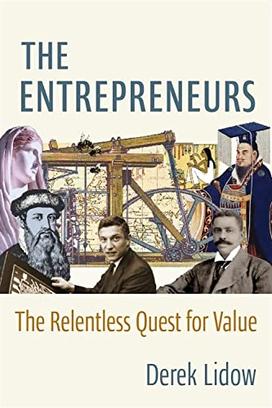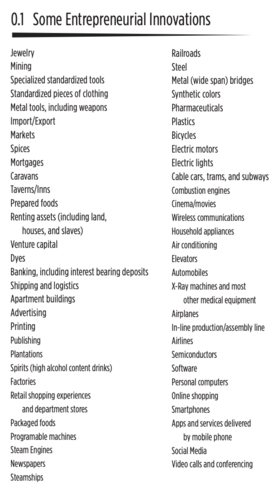Derek Lidow ’73 Explores the History and Impact of Entrepreneurship
The book: In his latest book, The Entrepreneurs (Columbia University Press), Derek Lidow ’73 covers everything one would need to know on the topic of entrepreneurship. He starts with the history of entrepreneurship through the ages and explains the ways in which it has morphed and changed over time. Using various examples to illustrate his point, Lidow covers the pros and cons of entrepreneurship, as well as the larger impact the practice has on society. This deep dive offers a new perspective on a topic that touches so many areas including economics, skills, and leadership — and offers insights into the ways entrepreneurship is influencing and shaping both the present and the future. 
The author: Derek Lidow ’73 is a professor of the practice in the Keller Center for Innovation in Engineering Education. He earned his undergraduate degree in electrical engineering from Princeton and Ph.D. in applied physics from Stanford University. Lidow is a former CEO and founder of several companies. He’s also the author of various books including Startup Leadership and Building on Bedrock, and has published extensively on innovation, entrepreneurship, and leadership.
Excerpt:
Introduction
An Indispensable Problem
Ten inches tall and seventeen feet in length, the Qingming Shanghe Tu depicts a day in the life of a large city of the Song dynasty (960–1279 AD). This painted scroll is a revered masterpiece in China and an acknowledged milestone in the global history of art. It also provides us a captivating glimpse into the impact of entrepreneurship on everyday life a millennium ago. The scroll (figure 0.1) unrolls from right to left, taking the viewer on a journey from a morning in the countryside to an afternoon in the bustling city center. The city itself is located next to a river thriving with commerce. Its streets are clogged with vendors and customers of every class and status. There is even a high-stakes action set piece: a boat, its towline broken, careens toward the bridge in the center of town, causing panic all around.
Every detail is rendered crisply, down to the signs in shops listing their products and services. A fortune-teller’s shop advertises three services: “determining auspicious days,” “fortune-telling,” and “prognostication.” Other signs list the names of the shops’ owners: “Wang Family Paper Goods,” “Lord Wang’s Inn — Suitable for Long Stays,” “Li Family Shipping Company.”
Entrepreneurs are everywhere along the scroll: artisans, innkeepers, street vendors, traveling merchants, traders, wholesalers, along with shops of every type, including pawn shops. We can tell the classes apart by their clothes: laborers wear short leggings, students and humble civil servants wear scarves around their necks, merchants wear half-length robes over full-length pants, and higher-ranking officials and scholars wear full-length robes. Some restaurants, particularly the informal ones, appeal to a range of classes, and the fancier ones, located in extravagant, multistoried structures, are clearly intended only for wealthier clientele. That said, all classes can be seen enjoying their free time, spending what money they can spare on food, drink, and entertainment. They are also enjoying having choices. Thanks to the efforts of large numbers of entrepreneurs, many offering similar products or services, these citizens can go beyond satisfying the necessities of life. They are living large.
When customers of all classes can spend freely on goods and services offered by large cohorts — swarms — of entrepreneurs, you have an entrepreneurial golden age. The Qingming scroll depicts one of these times. It began with entrepreneurial innovations that made more terrain suitable for growing rice. China in the Song dynasty and the preceding Tang dynasty benefited from these innovations, which lowered the cost of food and added to the wealth of many small landowners. Having more food to sell spurred entrepreneurs to innovate new ways to sell it, leading to a cycle of entrepreneurial innovation that rapidly expanded the scale of their combined achievements. Driven to get customers to buy even more food and drink, Song dynasty entrepreneurs developed the business of hospitality. Their innovation thrives to this day.
Ten Millennia of Impact
There have been many other entrepreneurial golden ages throughout history. The entrepreneurial wealth creation we see today is far from unprecedented, as many would claim it is. Examining the similarity of entrepreneurial behaviors and outcomes over the past 9,000 years or so — as far back as explicit entrepreneurial behavior can reasonably be traced — yields profound new insights into exactly how entrepreneurs increase the standard of living of entire civilizations as well as affect society in powerful and surprising ways. As entrepreneurs shake the world, governments, religions, and other groups respond, attempting to influence the direction of these entrepreneurial efforts, with varying degrees of success. Entrepreneurship creates a dynamic within societies, amplifying the tension between change and regulatory constraint.
This book is about the impact of both entrepreneurs on society and society on its entrepreneurs. Entrepreneurship has created most of what we view as essential for living in today’s world. We venerate our entrepreneurs, and yet we still underappreciate their impact — both positive and negative — on society. The following partial list of ten millennia of entrepreneurial innovations, listed in approximate chronological order (table 0.1), shocks my students:

This list does not include the many critical services that entrepreneurs have successfully taken over from governments, scaling to make them accessible to much wider swaths of the population. For example, construction has been dominated by entrepreneurs since before 1760 BC, when Hammurabi posted laws concerning penalties for shoddy construction. I don’t include it because the first structures were not built by entrepreneurs. Likewise, lawyers, doctors, and other professionals are not on this list even though most have been entrepreneurs since their professions emerged as specialties available to the public and not just the ruling elite who initially employed them. I also omitted once-essential items that are now obsolete, such as phonographs, telephones, and carriages.
Consider what life would be like if these entrepreneurial innovations had never existed or never been made widely available. The world we know simply would not exist. Entrepreneurship’s impact on how we live has always been enormous, so ubiquitous and profound that we usually take it for granted. In fact, entrepreneurs are the primary shapers of our culture.
Consequences
Entrepreneurship’s impact on society is always profound, but that does not mean it is always exclusively to the good. In fact, it tends to run amok in predictable ways. Understanding and acknowledging the negative consequences of entrepreneurship can help society mitigate those consequences before they get out of hand. For example, only within the last few years have we truly begun to grapple with the negative effects of digital technology on our privacy, social lives, politics, and other key areas of life. For years after the introduction of these tools, as smart phones, social media, and other innovations proliferated with mind-boggling entrepreneurial speed, people and their leaders remained willfully blind to the potential dangers.
As we’ll see, by considering past entrepreneurial outcomes, we could have predicted our present concerns and worked to reduce some of these negative effects, leading to less runaway detrimental impact. Society’s capacity to anticipate and mitigate the unintended consequences of entrepreneurial innovations becomes clear as we look to the past.
Concern about the unintended effects of entrepreneurship is ancient. Most of us know Daedalus as the father of Icarus, the boy who flew too close to the sun. The full story is more intricate — and more salacious — than most realize. In classical times, the myth of Daedalus was widely known to be a parable of the perils of entrepreneurship.
Daedalus was the Greek ideal of a pure entrepreneur: a self-directed individual who utilized his “mechanical arts” to profit by selling his skills to the highest bidder. In the myth, Pasiphaë, queen of Crete, falls in love with a beautiful snow-white bull given to her husband, King Minos, by the god Poseidon. Wishing to mate with the bull, she asks the famous innovator Daedalus to build her a mechanical cow to hide within (figure 0.2). Using Daedalus’s creation, Pasiphaë becomes impregnated by the bull, giving birth to the monstrous Minotaur. The half-man, half-bull monster then feasts on the best young men and unwed women of the kingdom.
In desperation, King Minos contracts with Daedalus to design a structure to contain the Minotaur. Daedalus devises a cunning labyrinth for the purpose, and King Minos considers the technology so important that he imprisons the entrepreneur within his castle to keep its secret. To escape, Daedalus devises wings — feathers held together by wax — for he and son Icarus to fly to the mainland. Unfortunately, Icarus ignores his father’s warnings and flies too close to the sun. His wings melt, and he plunges to his death.
Daedalus’s skills were extraordinary, but the point of the myth was that his dazzling creations had horrific unintended consequences. Learned citizens of Greece and Rome were more alert to the potential unintended consequences of entrepreneurial innovation than we are today. As we will see, the governments of Athens and Rome worked to keep their entrepreneurs focused on the best interests of their citizens. As a result, the classical world enjoyed the benefits of an entrepreneurial golden age of extraordinary length and richness.
Excerpted from The Entrepreneurs: The Relentless Quest for Value Copyright (c) 2022 Derek Lidow. Used by arrangement with the Publisher. All rights reserved.
Reviews:
“Lidow takes on the study of entrepreneurship with a long historical lens, revealing compelling macro-patterns across time. A very enjoyable read.” — Kaihan Krippendorff, a strategy growth, and transformation expert.
“Our future success rests on our ability to harness the creative and innovative potential of all — a quest made possible only by understanding the evolution of entrepreneurship and the factors inherent in shaping the ecosystem in which founders operate. Derek Lidow’s work provides masterful insight into what has come before and how that should inform our efforts to create a more accessible, inclusive, and equitable path to entrepreneurship going forward.” — Anita Sands, board director of multiple companies, and venture partner, New Enterprise Associates












No responses yet